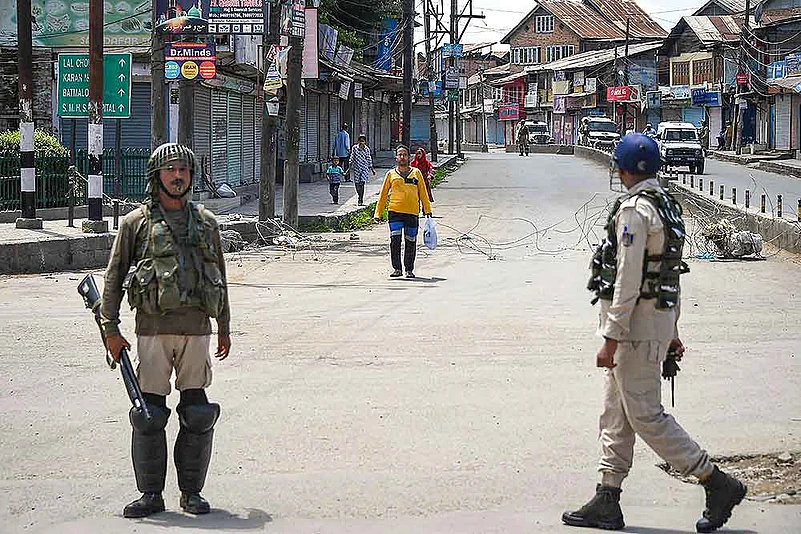As the Kashmir lock down enters 39th day, a thought arises if this would eventually fizzle out under international pressure like the 2001-2002 ‘Operation Parakram’, which failed due to lack of clear objectives by the then BJP political leadership.
However, unlike ‘Parakram’, which did not affect common people, the worst sufferers this time are the civilians as health services and communications have crippled.
In the case of ‘Parakram’, the initial objective was to destroy terrorist camps responsible for the attack on the Indian Parliament on December 13, 2001, and on the Jammu and Kashmir State Assembly on October 1, 2001. Subsequently, it shifted to destroying Pakistan’s strike corps after the daring suicide attack on Kaluchak military camp on May 14, 2002, killing 34.
Advertisement
‘Parakram’ was suddenly called off on October 16, 2002. Debate on why it was called off is still not settled. The military felt the government wanted war, but political leadership wanted troop mobilisation only as “coercive diplomacy”. The then Army Chief, Gen. Padmanabhan, had told a newspaper on February 6, 2004, that ‘Parakram’ was rendered ineffective due to “lack of clarity within the Cabinet”.
However, the human cost of that mobilization was not cheap. The then Defence Minister, George Fernandes, told the Rajya Sabha on April 30, 2003, that 1874 army personnel were killed or wounded during the operation from December 19, 2001, to October 16, 2002.
Advertisement
This type of transparency is not evident for Kashmir lockdown. Severe panic gripped the state with the sudden mobilization of security forces and government’s advisory asking tourists and pilgrims to leave the Valley.
Jammu and Kashmir Governor Satya Pal Malik’s statement on Article 35A on the eve of the crackdown was misleading. He blamed “vested interests” for the panic as they had mixed up “a pure security measure” with issues with which it had no connection.
Even now, there is no clarity why the civil population is put to hardship and how many people have been locked up in far-off jails. On September 7, National Security Advisor Ajit Doval told the media that heavy troop presence and lockdown were meant to protect the public from 230 Pakistan trained terrorists waiting to infiltrate Pakistan-Occupied Kashmir (PoK). He did not explain why mainstream politicians, including former chief ministers, who had resisted terrorism, had to be detained for that purpose.
However, this heavy troop presence could not prevent a Parimpura shop keeper from being shot dead by terrorists on September 6, thereby, forcing other shop keepers to keep their shops shut even after restrictions were relaxed. On 7 September, three people, including a baby girl, were injured in terrorist firing in Sopore.
The NSA also claimed that he was “convinced” that “a majority of Kashmiris totally support the abrogation of Article 370”. Another newspaper quoted him saying the restrictions on the civil population could be lifted “if Pakistan behaved”. This is an astounding statement from a high dignitary who is charged with protecting the innocent civil population that they would be freed from restrictions only if an inimical foreign country “behaved”.
Advertisement
Compared to this, our leadership is assuring that Article 371A, a similar provision like Article 370, which is applicable to the Northeast, will not be abrogated even in respect of those who have refused to recognise our constitution like the Naga group NSCN (IM), which is defiantly flying their own flags, collecting their taxes, celebrating August 14 as their independence day with military parade at their “legitimate” government headquarters at Hebron.
Our government should seriously consider the international ramifications of the lack of transparency in Kashmir. People in Valley celebrated Eid amid restrictions and heavy troop deployment. They were not allowed Muharram processions on September 10. This will sound as a totally discriminatory approach on religious grounds.
Advertisement
We also need to take note of the strong statement by US State Department spokesperson Morgan Ortagus on September 6 expressing their continued concern at “widespread detentions, including of local political and business leaders, and the restrictions on the residents of the region”. This is the first time the US has officially called upon New Delhi to schedule the promised elections and restore internet and mobile networks on human rights considerations. Except in 1971, New Delhi had always caught a cold when Washington DC sneezed.
(The writer is a former Special Secretary, Cabinet Secretariat. Views expressed are personal.)




















